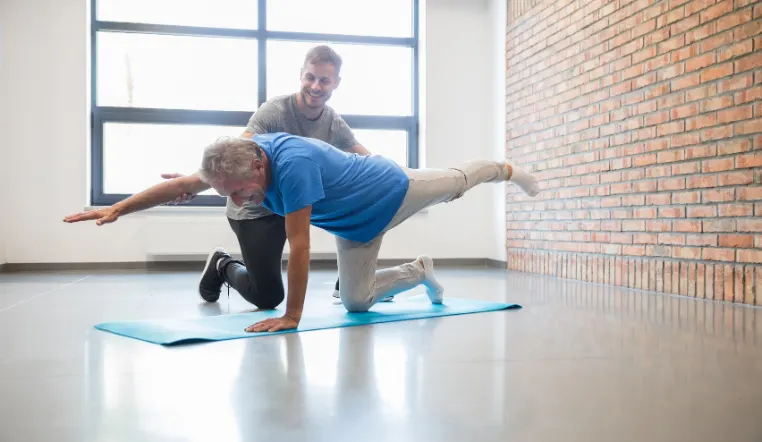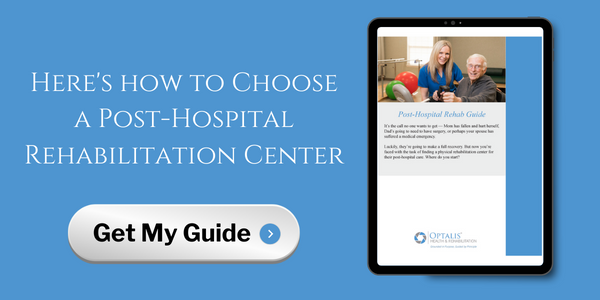Staying motivated is one of the most important parts of any rehabilitation journey. Whether it’s inpatient or outpatient therapy, or for an illness, surgery or injury, the success of your recovery depends for a large part on the effort you put into it.
If you stay motivated, it really increases your chances of success and recovery. Staying motivated makes it much more likely that you’ll reach your therapy goal, whether that’s getting back home or gaining a better quality of life.
Tips for Staying Motivated During Your Rehab and Therapy Plan
Tip #1: Don’t Think of Physical Therapy as a Chore
Rehab can be hard work, but that doesn’t mean you have to dread it. Try to think positive thoughts about your rehab appointments. Instead of looking at them as something standing in the way of the rest of your day, think of them as getting you one step closer to your goal.
As the rehabilitation manager of a Columbus rehabilitation center, I can tell you that we keep patients motivated by creating a really good atmosphere. We’ve created an open, fun and inviting setting in the rehab gym. That way, patients are eager to come to rehab instead of dreading it.
________________
Related: 9 Apps to Keep You Entertained in Post-Hospital Rehab
________________
Tip #2: Set Goals for Your Rehabilitation
Another important thing we do is set goals with each rehab patient. Everyone’s recovery looks different, and so should their goals. During the initial evaluation, we sit down with the patient and work on setting goals. We ask them, “what do you want to achieve?”.
The answer to that question varies. Maybe they want to return home, or maybe they have a certain activity they’d like to enjoy again. It might also be increased mobility or decreased discomfort. Whatever that goal is, we keep that top-of-mind when creating their rehab plan and make that the focus of each session.
For example, let’s say you love gardening but you’ve had a health setback that prevents you from being in the garden. Not only would we work with you on your strength and mobility to get you safely back outside, but we could even take you out to our garden to incorporate those activities into your therapy.
Tip #3: Involve Your Family and Friends for Motivation
Family and friends can also help by joining you at the rehab center. At our center, members of your support group are welcome to come and see what we do. While they’re there, we can help educate them on how to help you when you’re finished with inpatient or outpatient rehab.
We can work with your friends and family to come up with home exercises to do together. We’ll show them how to safely help you walk, go to the bathroom, etc. Helping someone with these basic tasks may sound simple, but more goes into it than you might think.
For example, if you are using a walker during your recovery, your family member or friend might not be comfortable with helping you use that because they don’t have experience with it. We can show them how best to help you so they feel more confident.
________________
Related: How is Patient and Family Communication Handled in Rehab?
________________
Tip #4: Connect with Your Physical Therapy Team
Now, this is one tip that you don’t have to worry about too much because your physical therapist will be sure to connect with you to help you feel more at ease, and to help them better plan your rehab course.
I will tell you, the people that go into therapy as a career typically have outgoing, upbeat attitudes. You don’t get into this field unless you truly want to help people. I go to the therapy gym quite often to check on things and keep the morale up, and what I see is very encouraging. People are always laughing and having conversations as they work.
Involving a patient in conversations while they’re in therapy is key. We want to learn about you, your family, your life. It helps keep that motivation high to come back because the more comfortable you feel with the therapists, the more likely you are to have a positive experience.
Think about it—when you’re receiving physical therapy (or occupational or speech therapy), you’re likely to be in close proximity with your therapist. Usually, they’ll have to touch you to show you how to properly complete an exercise. It can be awkward to have a stranger put a hand on you and hold your arm, so that’s why it’s much better for patients if we build a rapport with them.
________________
Related: Ask the Expert: Post-Hospital Rehab Insurance Questions
________________
Things to Help You Stay Motivated
As you can see, your therapist will do everything they can to keep you motivated. However, it’s important for that motivation to come from within, as well.
Here are some tips to help yourself stay motivated from day-to-day on your road to recovery:
- Music. Create a playlist of your favorite music. Play it before your therapy session (or even during, if your therapist is on board) to get yourself energized and focused on the task ahead.
- Inspirational quotes. It may sound a little corny, but having an inspirational quote or mantra can help you stay motivated. Choose a saying that resonates with you, like “whether you think you can, or you think you can’t, you’re right” (Henry Ford said that) or “strive for progress, not perfection.”
- Celebrate meeting your goals. You’ll work with your therapist to set goals based on your therapy plan. Your therapist will help you keep track of your progress, but celebrating milestones with your family and friends can help keep you motivated and positive.



